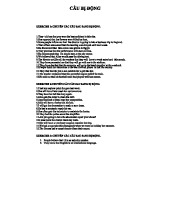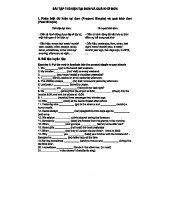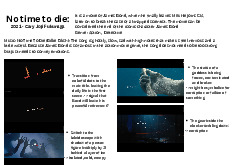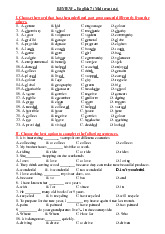





Preview text:
Bài tập Tiếng Anh 7 Global Success Unit 1, 2, 3
Choose the word whose underlined part is pronounced differently from the others 1. A. arrived B. believed C. received D. hoped 2. A. month B. thousand C. thick D. then 3. A. tiny B. light C. continue D. blind 4. A. tutor B. duck C. cube D. music 5. A. waited B. mended C. objected D. faced
Fill in the blanks with the correct tense of the verbs in brackets.
1. Last summer Phong (not volunteer) _________________ to teach maths to street children.
2. The children (be/ not) _________________ at home last weekend.
3. It (be)_________________very cold today. You should wear your warm clothes when
you (go)_________________out to prevent cold.
4. They (visit) _________________ a farm two weeks ago.
5. Japanese (eat)_________________ more fish instead of meat, so they
(stay)_________________more healthy.
6. Watching TV much (hurt)_________________ your eyes.
Choose the correct answer
1. Does your father like …………………….photos? A. doing B. making C taking D. having
2. A lot of people enjoy ...................... things such as dolls, stamps or bottles. A.making B. arranging C. doing D. collecting
3. A lot of girls love holding their weddings ...................... A.challenging B. outdoors C. in board games D. unusual
4. Mai often helps her mother ...................... and water trees in her free time. A.hurt B. burn C. carve D. plant
5. Some people suffer from ................... after losing their jobs. A. depression B. allergy C. spot D. weak
6. Eating too much can also cause a ................... A. sore throat B. stomachache C. weak D. earache
7. It is said that ................... is bad for our health. A. junk food B. calorie C. compound D. conjunction
8. Try to study harder and be more active to ...................... to your life. A. make a difference B. raise money C. clean up D. donated
Read the passage and then choose the best answers.
Each country has many good people who take care of others. For example, some of
students in the United States often spend many hours as volunteers in hospitals,
orphanages or homes for the elderly. They read books to the people in these places, or
they just visit them and play games with them or listen to their problems.
Others young volunteers go and work in the homes of people who are sick or old. They
paint, clean up, or repair their houses, do the shopping. For boys who don't have fathers,
there is a organization called Big Brothers. College students and other men take these
boys to basketball games or on fishing trips and help them to get to know things those
boys usually learn from their fathers.
Each city has a number of clubs where boys and girls can go and play games. Some of
these clubs show movies or hold short trip to the moutains, the beaches, museums, or
other places of interest. Most of these clubs use a lot of students as volunteers because
they are young enough to understand the problems of younger boys and girls.
1. What do volunteers usually do to help those who are sick of old in their homes?
A. They do the shopping, and repair or clean up their house.
B. They tell them stories and sing dance for them.
C. They cool, sew, and wash their clothes.
D. They take them to basketball games.
2. What do they help boys whose fathers do not live with them?
A. To learn things about their fathers.
B. To get to know thing about their fathers.
C. To get to know things that boys want from their fathers.
D. To learn things that boys usually learn from their fathers.
3. Which activities are NOT available for the students at the clubs? A. playing games B. learning photography C. going to interest places D. watching films
4. Why do they use many students as volunteers? - Because ________________.
A. they can understand the problems of younger boys and girls.
B. they have a lot of free time.
C. they know how to do free time.
D. they are good at playing games and learning new things.
5. Where don't students often do volunteer work? A. hospitals B. orphanages C. clubs D. homes for the elderly
Choose the correct answer
Have you ever wanted to do something _________ (1)? Five years ago Will Slade read
about _________ (2) organisation called “Earthwatch”. Earthwatch finds volunteers for
expeditions to study and (3) _________ different parts of the world.
Will _________ (4) to join an expedition to study elephants in Africa. “I wasn’t sure
about it before I went”, says Will. “But in fact, I really enjoyed every mintue of the
expedition. We slept _________ (5) tents and we cooked our own food, but it was great
to see the elephants and all the other animals there”. 1. A. difference B. indifferent C. different D. differently 2. A. a B. X C. the D. an 3. A. to explore B. explore C. exploring D. for exploring 4. A. like B. advised C. decided D. suggested 5. A. in B. on C. under D. out of
Complete the second sentence, using the words in brackets.
1. I think classical music is not as exciting as rock and roll. (more... than)
I think rock and roll _________________________________________
2. Jane stayed behind after the class in order to talk to the teacher. (because)
Jane _____________________________________________________
3. I’m leaving now because I don’t want to miss the train. (so)
I’m ______________________________________________________
Find and correct the mistakes
1. Did Lucy went to a pharmacy three days ago?
_____________________________________________________
2. We clean the beach last Sunday.
_____________________________________________________
3. We can ask people to donate warm clothes and helping them to rebuild their houses.
_____________________________________________________
4. I see a real elephant when I went to Ban Don last year.
_____________________________________________________ -The end-
Đáp án bài tập Tiếng Anh 7 Global Success Unit 1, 2, 3
Choose the word whose underlined part is pronounced differently from the others 1. D 2. D 3. C 4. B 5. D
Fill in the blanks with the correct tense of the verbs in brackets.
1. Last summer Phong (not volunteer) __________didn’t volunteer_______ to teach maths to street children.
2. The children (be/ not) _______weren’t__________ at home last weekend.
3. It (be)_______is__________very cold today. You should wear your warm clothes
when you (go)__________go_______out to prevent cold.
4. They (visit) ________visitted_________ a farm two weeks ago.
5. Japanese (eat)_________eats________ more fish instead of meat, so they
(stay)________stay_________more healthy.
6. Watching TV much (hurt)_____hurts____________ your eyes.
Choose the correct answer 1. C 2. D 3. B 4. D 5. A 6. B 7. A 8. A
Read the passage and then choose the best answers. 1. A 2. D 3. B 4. A 5. C
Choose the correct answer 1. C 2. D 3. B 4. C 5. A
Complete the second sentence, using the words in brackets.
1. I think rock and roll is more exciting than classical music
2. Jane stayed behind after the class because she wanted to talk to the teacher.
3. I’m leaving now, so I won’t/ don’t miss the train.
Find and correct the mistakes 1. went => go
Did Lucy go to a pharmacy three days ago? 2. clean => cleaned
We cleaned the beach last Sunday. 3. helping => help
We can ask people to donate warm clothes and help them to rebuild their houses 4. see => saw
I saw a real elephant when I went to Ban Don last year.




